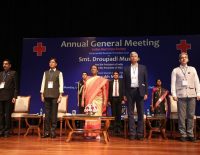With 85% health illiteracy in India, experts push for CSR-funded health awareness drives

Health experts and industry leaders have stressed the urgent need for Corporate Social Responsibility (CSR) to play a larger role in addressing India’s growing healthcare challenges. With rising cases of lifestyle diseases like diabetes, hypertension, and obesity, experts believe that CSR funding must be channelled into large-scale awareness programmes to help people make informed health choices.
At the Healthcare CSR Catalyst Stakeholders Meet 2025, leading doctors, corporate representatives, and policymakers came together to discuss how CSR can bridge critical healthcare gaps. They emphasised that while companies invest significant CSR funds in healthcare, a large portion is often spent on infrastructure, leaving health literacy and preventive care neglected.
Adding to the discussion, Dr H K Chopra, Chief Cardiologist, Medanta Moolchand Heart Institute, New Delhi, warned of India’s rising burden of lifestyle diseases, stating, “India is fast becoming the global capital of diabetes and hypertension. Nearly 40% of patients are hypertensive, and 90% of them have uncontrolled blood pressure. We need CSR-driven awareness campaigns to educate people about prevention and early diagnosis. A healthier nation is a stronger nation.”
Padma Shri awardee Dr Mohsin Wali, Senior Consultant at Sir Ganga Ram Hospital, highlighted the severity of India’s health literacy crisis, stating, “With 85% of Indians lacking basic health awareness, CSR must step in to educate communities and drive preventive care. CSR embodies the spirit of service and should focus on impactful public-private partnerships. Initiatives like Nirog Nagarpalika by HEAL Foundation can transform public health at the grassroots level.”
Dr Aijaz Ilmi, Consultant Physician at Helvetia Diagnostics & Healthcare, pointed out that chronic diseases are now affecting younger populations, stating, “We are witnessing a 20-year pandemic of metabolic diseases, with conditions like obesity, fatty liver, and diabetes appearing in children as young as 10. The only way to reverse this crisis is through awareness and early intervention. CSR must prioritise school-based health programmes, community screenings, and sustainable lifestyle initiatives to prevent long-term health complications.”
Experts at the event agreed that CSR must shift focus from short-term interventions to sustainable, community-driven healthcare models. Strengthening awareness, early detection, and preventive care through CSR-backed initiatives could be a game-changer in tackling India’s escalating health crisis.







